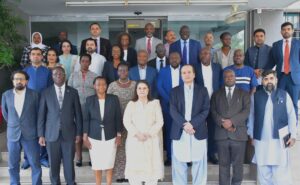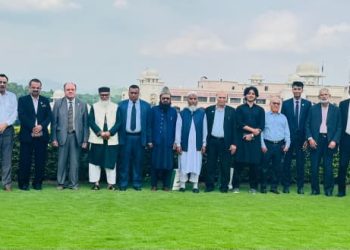ISLAMABAD( WNAM MONITORING): The Benazir Income Support Programme (BISP) is the largest social protection initiative in Pakistan, launched in 2008 as a flagship program. The BISP was envisioned by Shaheed Mohtarma Benazir Bhutto, and it serves not only as a social protection program but also as a pathway to women’s empowerment. Through BISP, women and their children are being registered under the National Socio-Economic Registry (NSER), which is a key strength of the program.
The Government of Sindh has waived the birth registration fee, and we hope other provinces will follow the suit. These were the opening remarks of Senator Rubina Khalid Chairperson BISP while addressing a high-level delegation from Uganda that visited the Benazir Income Support Programme (BISP) headquarters.
Chairperson BISP, Senator Rubina Khalid, and Secretary BISP, Amer Ali Ahmad, welcomed the 21-member delegation, which was led by Ms. Lucy Nakyobe Mbonye, Secretary of Public Service, Uganda. The delegation is on a four-day study visit to Pakistan, from October 22 to 25, 2024, aimed at learning from Benazir Income Support Programme experiences. The delegation focused on certain areas including national socio economic registry which ensures the accurate identification of poor and deserving individuals and the timely provision of services.
Senator Rubina Khalid noted that one of the key strengths of BISP is its internationally recognized and authentic database. She also mentioned the introduction of a poverty graduation program aimed at improving the economic conditions of BISP beneficiaries, allowing more deserving individuals to benefit from the program.
Senator Rubina Khalid further emphasized that BISP enjoys the support of all political parties and stakeholders in Pakistan. She stressed the importance of mutual cooperation between the federal and provincial governments to support the 9.3 million deserving families under BISP.
Secretary BISP, Amer Ali Ahmad, informed the delegation that in addition to financial support, BISP is committed to providing high-quality services to its beneficiaries. He mentioned the recent launch of a new banking model that ensures the transparent and dignified distribution of funds to deserving women.
Ms. Lucy Nakyobe Mbonye, head of the Ugandan delegation, praised BISP as an exemplary program for the welfare of underprivileged populations. She expressed interest in learning from BISP’s National Socio-Economic Registry, targeting mechanisms, digital payment systems, and stakeholder collaboration. She noted that these insights would be valuable in shaping Uganda’s social protection policies.
Additional Secretary BISP, Dr. Muhammad Tahir Noor, attributed BISP’s success to its modern, scientific, and objective targeting, the trust of international partners, and independent third-party monitoring.
Ms. Coco Ushiyama, Country Director of the World Food Program, also commended BISP’s evidence-based database and its role in providing timely assistance during natural disasters.








